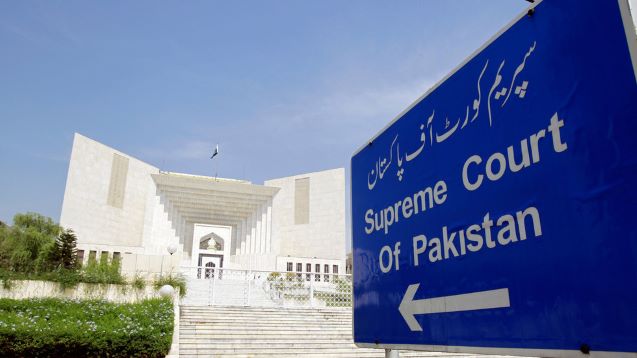ISLAMABAD: In what has been billed as a verdict that buried the so-called doctrine of necessity, the Supreme Court declared the decision of the Election Commission of Pakistan (ECP) to delay the vote in Punjab until October 8 as never to have existed and against the Constitution by reviving the election schedule.
Restoring the election schedule issued by the tribunal on March 8 with some modifications, the unanimous verdict by a three-judge bench — headed by Chief Justice Umar Ata Bandial and consisting of justices Ijaz ul-Ahsan and Munib Akhtar — then set May 14 as the new date for the election in Pakistan’s most populous province.
However, the court will continue hearing the case of elections in Khyber Pakhtunkhwa.
“The impugned [March 22] order [of] the Election Commission of Pakistan [to postpone elections] is declared to be unconstitutional, without lawful authority or jurisdiction, void ab-initio, of no legal effect and is hereby quashed,” the judgement on Tuesday read.
“Neither the Constitution nor the law empowers the Commission to extend the date of elections beyond the 90 days period as provided in Article 224-2 of the Constitution,” it added.
The ruling, on a petition moved by Pakistan Tehreek-i-Insaf (PTI) to challenge the tribunal’s decision, was reserved on Monday after the bench heard all the stakeholders — including the opposition party, election tribunal, and members of the ruling Pakistan Democratic Movement (PDM) coalition.
In its order, the court directed the commission to conduct the election in Punjab by May 15, lamenting that its decision had wasted 13 days of the electoral process.
The verdict instructed candidates to submit their nomination papers by April 10 and the commission to publish the list of candidates on April 19, with electoral symbols to be issued by April 20.
The judges observed that during court proceedings the commission had explicitly said it could conduct the general elections with integrity, impartiality, and fairness if it was given appropriate support and cooperation from the executive authorities in Punjab and Khyber Pakhtunkhwa and the Centre.
The ruling said the court took note of this statement, before ordering the federal and caretaker governments to assist the agency and release Rs21 billion for the elections by April 10.
It warned that in case of non-provision of funds, an appropriate order would be issued. If there is a shortage of funds for the elections in Khyber Pakhtunkhwa later, the ECP can make a request to the court for “consideration and appropriate orders,” the commission was told.
Earlier in the day, the defence secretary submitted a report to the judges in their chamber regarding the availability of security personnel during the elections. He and the finance secretary were instructed by the court to present reports that demonstrate the obstacles preventing the elections from taking place.
PML-N DEMANDS FULL COURT
Following the announcement of the verdict, Law Minister Azam Nazir Tarar expressed his dissatisfaction, saying the Supreme Court should have made a decision based on “collective wisdom”.
Addressing a press conference, he said the entire court should have been involved in the case., and predicted the ruling would worsen the current political situation and crisis.
He said that lawyers representing the commission and other parties involved in the case had argued that the court should have first resolved the March 1 verdict, which he claimed had been “rejected by a margin of 4-3.”
According to the minister, a full court should have cleared up the confusion surrounding the previous ruling.
Shortly before the announcement of the judgement, Interior Minister Rana Sanaullah Khan had expressed hope the court would help end the political crisis in the country, adding that the government’s demand for a full court still stands.
He also emphasised that simultaneous elections should be held in the country to avoid further political crises. Nazir Tarar, who stood beside Khan, echoed his statements and urged the court to use “collective wisdom” in handling the matter.
THE PROCEEDINGS
During the hearings, which spanned over a week, the case witnessed high drama when two judges of the original five-judge bench, Jamal Khan Mandokhail and Amin ud-Din Khan, recused themselves from the case.
Subsequently, the chief justice formed a new bench comprising himself, Justice Ahsan, and Justice Akhtar to proceed with the matter.
Over the weekend, a meeting of PDM leaders expressed “no confidence” in the bench, leading to a call for a full court to hear the case. Chaired by Prime Minister Shehbaz Sharif to “devise a future strategy” for the government, the meeting demanded that present court proceedings be terminated by accepting a different judgment.
However, on Monday, the Supreme Court said the formation of a full court to take up the petition was not an option and the government could instead request a larger bench to hear the case.
Bandial’s offer of a larger bench to the government came after Shehbaz Sharif, through Attorney General Mansoor Usman Awan, formally requested the reconstitution of the bench hearing the case.
In the plea filed on behalf of the federation, the Supreme Court was requested to dismiss the election delay case in light of the March 1 judgment ruling that elections for the provincial assemblies in Punjab and Khyber Pakhtunkhwa must be held within 90 days.
The petition said the proceedings in the current petition should be postponed in light of the observation passed by Justice Qazi Faez Isa, postponing all the proceedings in suo motu matters, which the chief justice “disregarded.”
“This […] bench, in view of submissions made in paragraphs 11 and 12, may graciously recuse from hearing the instant petition and a bench comprising of all remaining […] judges of this court, who did not hear [the matter previously] may kindly be constituted to decide the questions raised herein,” it requested.__Pakistan Today





